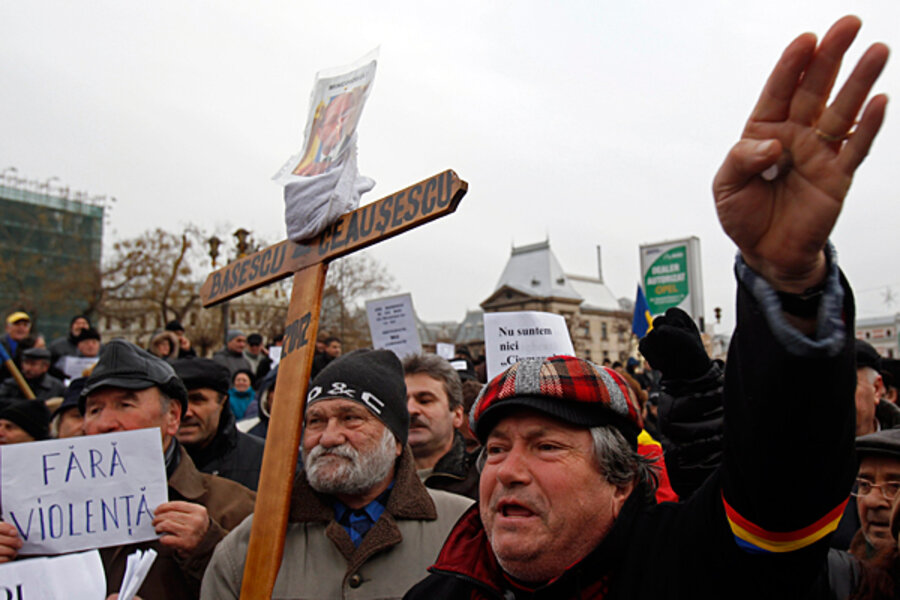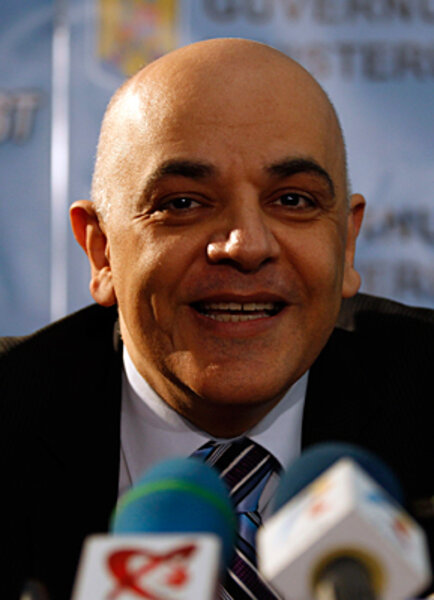In Romania, protesters find voice after years of apathy
Loading...
| Belgrade, Serbia
Protests drawing thousands to the streets and leading to violent clashes in Romania have brought years of anger about economic stagnation and official corruption to the surface. On Tuesday night, the future of the government remained uncertain as demonstrators continued to call for the president’s resignation.
The country of 22 million people, one of the newest, most populous, and poorest EU members, is undertaking a long haul out of its economic crisis, and austerity measures are cutting deep. The perception of a remote, authoritarian, and corrupt political and economic elite that has changed little since the days of Communism has exacerbated public frustration.
But the protests have added a new dynamic to Romania’s political and social scene. After some years of apathy, public anger and a desire for change are being expressed on Romanian streets again. The demonstrations forced the government Tuesday to reinstate popular deputy health minister Raed Arafat, whose departure triggered the protests last week.
“The Arafat affair could just be the tip of the iceberg,” says political analyst Dorel Sandor. “It’s opened a [Pandora’s] box, revealing a lot of sensitive issues – this is very new for Romanian society. While the protests have not been that large, they are a very important signal.”
Mr. Arafat is viewed as a rare example of efficiency and transparency in modern Romania. He resigned last week after an acrimonious public dispute with President Traian Basescu over a new health bill that would generate greater private participation in emergency health services. In a live television program where viewers can call in, a favorite Basescu platform, the president attacked Arafat in personal terms.
Ongoing austerity measures is one of the many issues being protested. Following several years of high growth and rising government spending, in 2009 Romania accepted a €20 billion loan from the IMF, and in turn imposed a 25 percent cut in public sector salaries and a 5 percent increase in value-added taxes. Many state jobs were also eliminated. During this time, Romanians have grown less tolerant of Basescu, seeing him as increasingly aloof and authoritarian.
But while the demonstrators have focused on the president, leading Romanian journalist Ovidiu Nahoi says he believes the root cause of dissatisfaction is more complex and dates back to before 2009.
Corruption looms large
“The protests aren’t just against one person,” he said. “Pensions, prices, poverty, injustice, and corruption are all major issues that have been amplified by austerity. People are protesting not just against austerity, but against a political system seen to be corrupt and unjust. They want a new structure of society.”
The demonstrations, which entered their sixth day on Tuesday, have been predominantly peaceful and relatively small, but several hundred people have been arrested and dozens wounded. Protesters have set fire to cars and buildings and have hurled bricks and chunks of concrete at police, who in turn have been accused of violent response.
Despite Arafat’s return this week, and the rapid scrapping of the president's controversial health bill, protesters have threatened to continue rallying until the embattled Basescu resigns. Many believe it is unlikely the protesters, who are portraying themselves as the European equivalent of the Arab Spring, will topple the Basescu government before this year's election.
Furthermore, the president is strongly allied with Prime Minister Emil Boc, who has a small but sustainable majority in parliament. Though the current government is expected to hold its ground, if there is a split, it is far from certain the opposition, which is divided and tainted by previous stints in power, will be able to answer protesters' calls for change.








